Reference Letter Templates: Streamline Your Writing Process with 19 Ready-to-Use Formats
Welcome to our reference letter page! Here, we understand the importance of this letter in various areas of life, from academic pursuits to professional endeavors. Whether you are seeking or providing a reference letter, this page aims to guide you through the process, offering valuable tips and insights to ensure your reference letters are impactful, well-crafted, and persuasive. With our comprehensive resources, you will discover how to choose the right referees, format your letters professionally, and convey the strengths and qualifications of the individuals in question. We invite you to explore our content and empower yourself to write compelling letters that open doors and create opportunities. Let’s embark on this journey together and make a positive difference with the power.
How to Choose the Right Referee
When choosing the right referee to write a reference letter, it is crucial to consider several factors to ensure the letter is impactful and authentic. Here are some tips to guide you in selecting the most appropriate individual:
- Personal Connection: Look for someone who has a personal connection with the individual and knows them well. This could be a supervisor, manager, colleague, professor, or mentor who has worked closely with the individual and can provide valuable insights into their skills, character, and accomplishments.
- Relevant Experience: Consider the referee’s expertise and experience in the field related to the purpose.
- Professional Reputation: Choose a referee who has a positive professional reputation and credibility in their field. This can add weight to the reference letter and enhance its impact. Referees with extensive experience and recognized achievements can provide valuable endorsements.
- Comprehensive Assessment: Ensure the selected referee can provide a comprehensive assessment of the individual’s abilities, strengths, and suitability for the intended purpose. They should be able to highlight the individual’s specific skills, achievements, and unique qualities that make them stand out.
- Positive Relationship: It is important to choose a referee who has a positive relationship with the individual. A referee who genuinely supports and believes in the individual’s potential can provide a more authentic and enthusiastic recommendation.
- Timeliness and Availability: Consider the referee’s availability and willingness to write the reference letter within the given timeframe. Ensure they can commit to submitting the letter by the deadline to avoid any delays or complications in the application process.
- Confidentiality and Trust: Select a referee who can maintain confidentiality and respect the privacy of the individual. It is crucial to choose someone who will handle these documents with integrity and professionalism.
#1: Academic Reference
An academic reference letter serves as a valuable document written by an educational professional to provide an in-depth evaluation of a student’s academic capabilities, personal qualities, and potential. This letter is commonly requested by students when applying for scholarships, internships, graduate school, or other academic opportunities. Its primary purpose is to offer valuable insights into the student’s academic performance, work ethic, leadership skills, and distinctive attributes that make them a compelling candidate. By providing a credible endorsement, the reference letter helps the recipient assess the applicant’s suitability and potential for success in their academic pursuits. It effectively showcases the student’s strengths, accomplishments, and unique characteristics, thereby supporting their application and enhancing their prospects of being selected for the desired opportunity.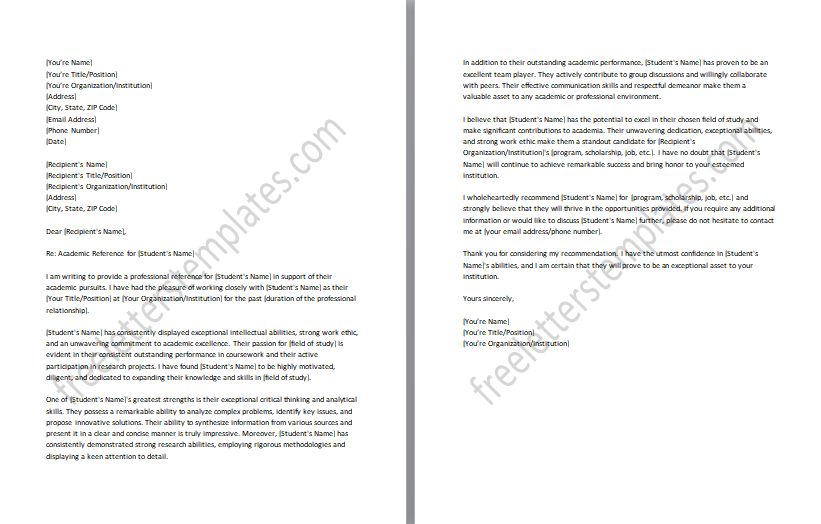
#2: Character Reference
A character reference letter serves as a testimonial provided by someone who has personal knowledge of the individual’s character, integrity, and reputation. It is commonly requested in various situations, such as job applications, volunteer opportunities, legal proceedings, or when establishing credibility. The purpose of a character reference letter is to provide an unbiased assessment of the individual’s moral values, interpersonal skills, and positive qualities. It offers insights into their trustworthiness, reliability, and ethical conduct, showcasing their suitability for the opportunity or situation at hand. By providing a firsthand account of the individual’s character, the letter aims to support their application and provide assurance to the recipient about their integrity and positive attributes.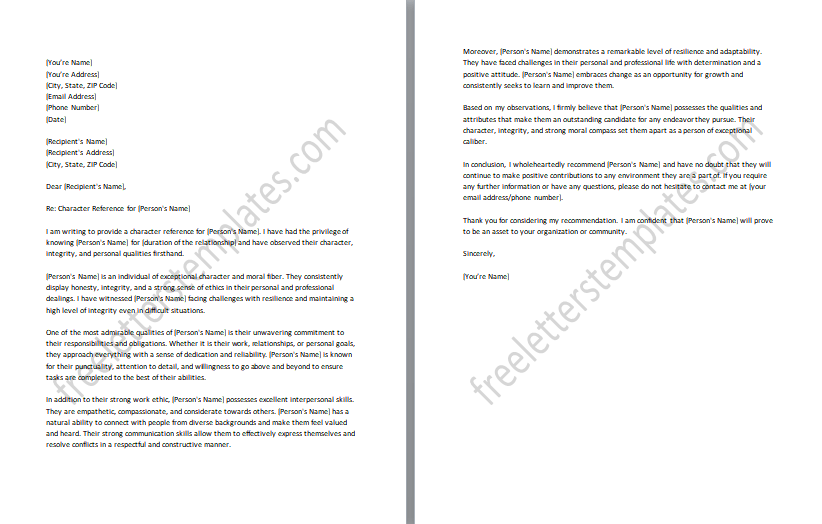
#3: Professional Reference
A professional reference letter is a document provided by a person who can attest to an individual’s professional qualifications, expertise, and experience. This letter is typically requested during job applications, career advancements, or networking. It highlights the individual’s accomplishments, strengths, and unique abilities that make them a valuable contributor in the workplace. The letter serves as a credible endorsement of the individual’s aptitude, work ethic, and character, aiding the recipient in evaluating their suitability for the position. Ultimately, the professional reference letter supports the individual’s application, strengthens their profile, and improves their chances of securing their desired opportunity.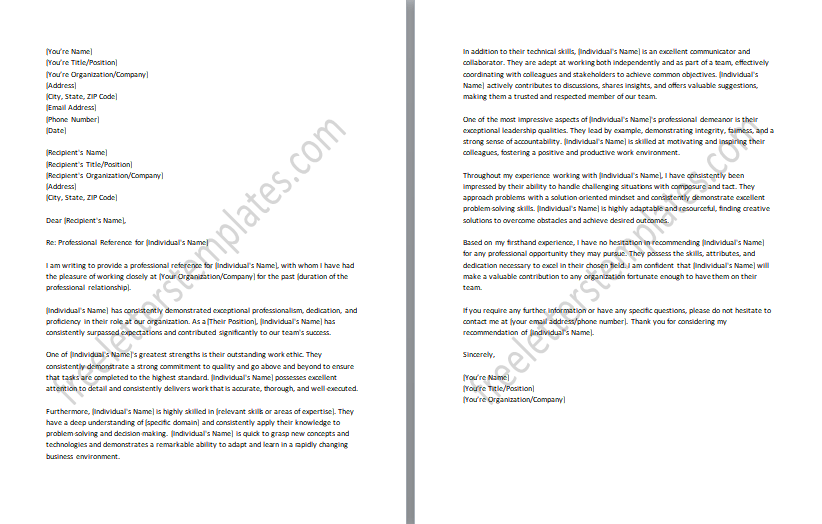
#4: Personal Reference
A personal reference letter is a written testimonial provided by someone who shares a personal connection with the individual and can vouch for their character, qualities, and suitability for a specific purpose. These documents are often requested for various reasons, like rental applications, adoption processes, volunteer positions, or character assessments. The main aim of a personal reference document is to offer an authentic and unbiased evaluation of the individual’s attributes, integrity, and reliability. It provides valuable insights into their skills, moral values, and overall demeanor, helping the recipient form an impression about the individual’s suitability for the desired opportunity or situation.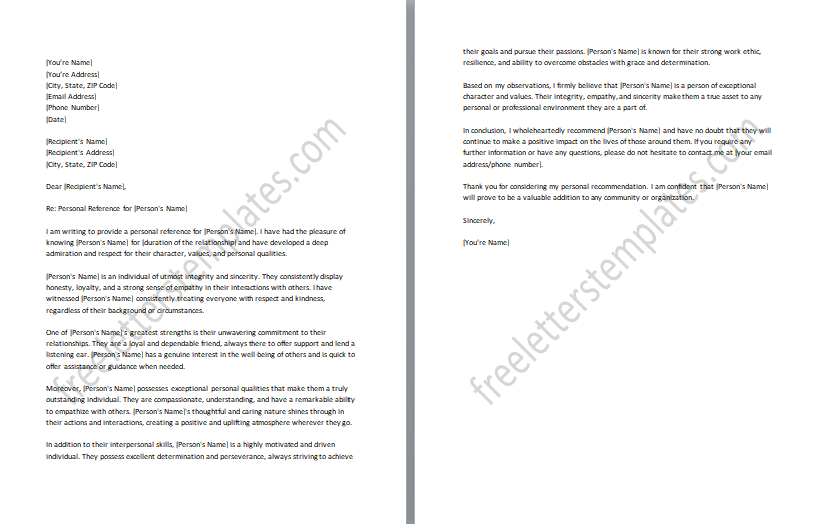
#5: Business Reference
A business reference letter is a valuable document provided by an individual who can provide an honest and impartial evaluation of someone’s professional abilities, work ethic, and character within a business context. A business aims to offer genuine insights into the individual’s skills, accomplishments, and potential contributions in a setting. It provides a comprehensive understanding of their work performance, leadership qualities, and overall professionalism, enabling the recipient to assess their suitability for a specific role or business opportunity. The letter effectively highlights the individual’s unique strengths, expertise, and distinct qualities that position them as valuable assets in any business environment.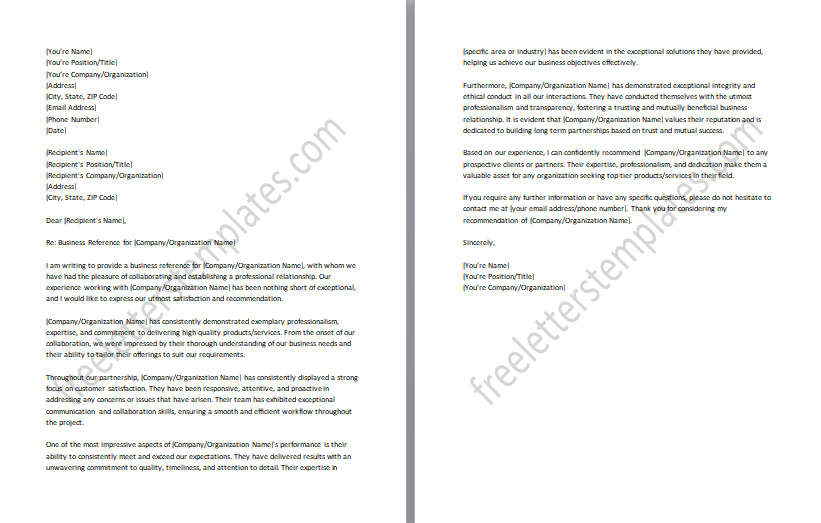
#6: Rental Reference
A rental reference letter is a valuable document provided by someone who has personal experience with an individual’s rental history and can honestly assess their suitability as a tenant. These letters are often requested when applying for a rental property, especially if the applicant has limited rental experience or wants to enhance their application. The purpose of a rental is to offer insights into the individual’s reliability, responsibility, and adherence to lease agreements. It typically includes information about their payment history, cleanliness, respect for property, and ability to maintain positive relationships with landlords and neighbors. This serves as evidence of the individual’s trustworthiness and can significantly impact the landlord’s decision when selecting a tenant.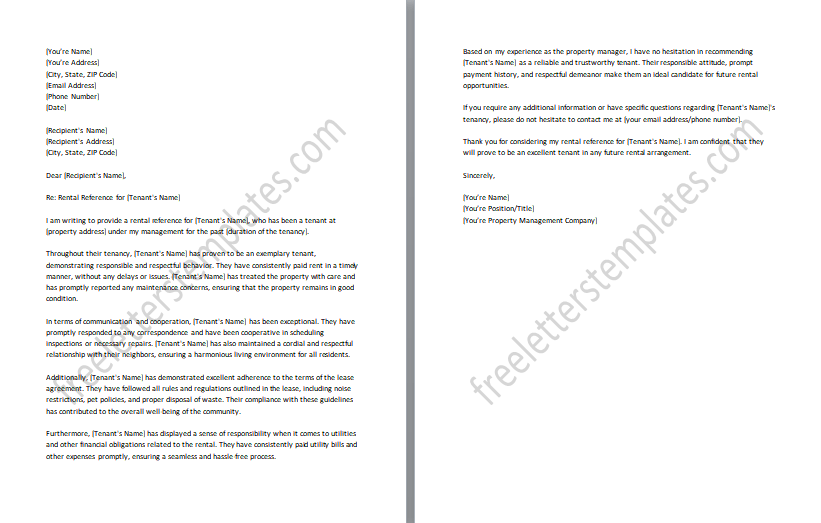
#7: Scholarship Reference
A scholarship reference letter is a valuable document provided by an individual who can provide an objective assessment of an applicant’s qualifications, achievements, and potential to succeed in a scholarship program. These are commonly requested as part of scholarship applications, where applicants need to showcase their academic abilities, leadership qualities, and personal attributes. The purpose of a reference is to offer an unbiased evaluation of the applicant’s strengths, accomplishments, and character traits that make them deserving of the scholarship. It highlights their academic performance, involvement in extracurricular activities, community service, and any other pertinent achievements. The letter serves as a credible endorsement, assisting the committee in assessing the applicant’s suitability and potential for success.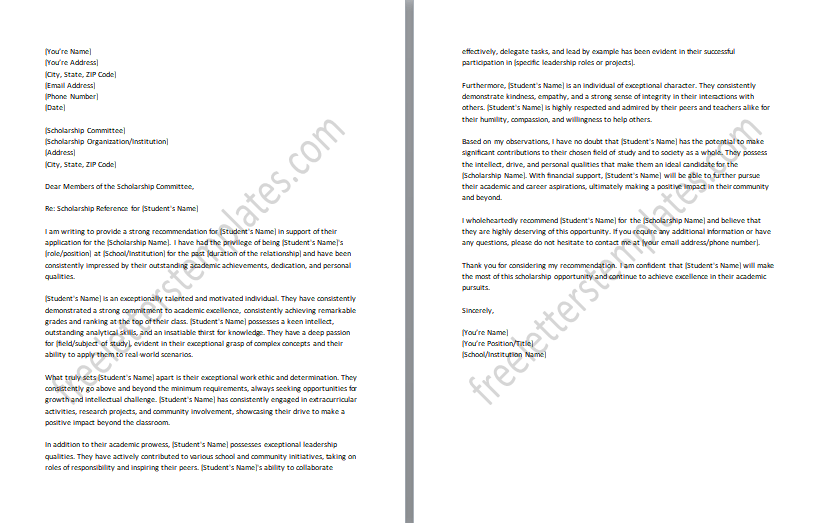
#8: Volunteer Reference
A volunteer reference letter is a valuable document provided by an individual who can offer an insightful assessment of someone’s contributions, dedication, and character in their selfless endeavors. These letters are often requested when individuals apply for humanitarian roles, community service awards, or other opportunities where their compassionate efforts are highly valued. The purpose of an altruistic letter is to provide an authentic and unbiased evaluation of the individual’s commitment, skills, and impact on their selfless actions. It highlights their specific contributions, reliability, and ability to work collaboratively with others for the betterment of society. The letter serves as a testimonial, showcasing the individual’s compassion, work ethic, and positive attitude in making a difference. By emphasizing their unique qualities and the value they bring to their selfless actions, the aim is to support the individual’s application and enhance their chances of securing the desired role or recognition in their humanitarian endeavors.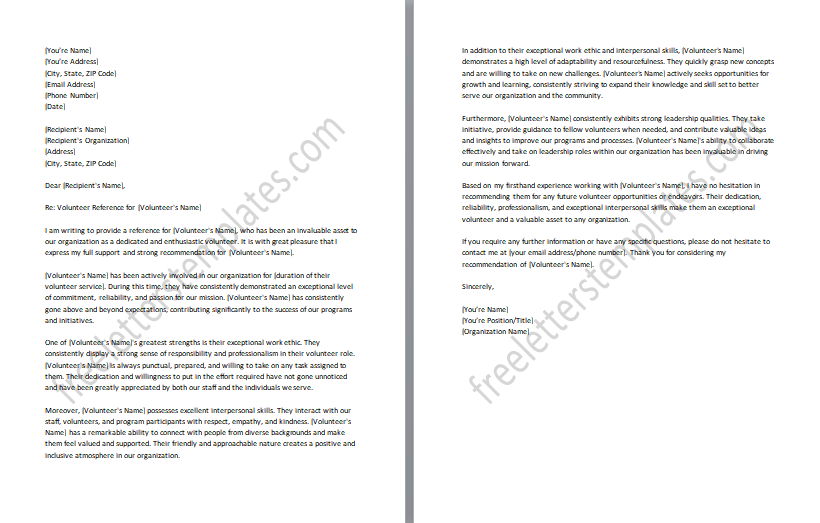
#9: Immigration Reference
An Immigration reference letter is a significant document provided by an individual who can vouch for someone’s character, skills, and suitability for a specific purpose, such as visa applications, residency processes, or other relevant procedures. These letters are often required during application processes or legal proceedings. The purpose of an endorsement reference letter is to provide an authentic and objective evaluation of the individual’s personal attributes, qualifications, and contributions to their community or workplace. It highlights their integrity, professionalism, and positive impact, offering insights into their ability to adapt, integrate, and excel in the given context. The letter aims to support the individual’s case by providing evidence of their positive character and potential contributions, helping authorities assess their eligibility and suitability. It serves as a testimonial, strengthening the applicant’s profile and increasing their chances of a successful outcome.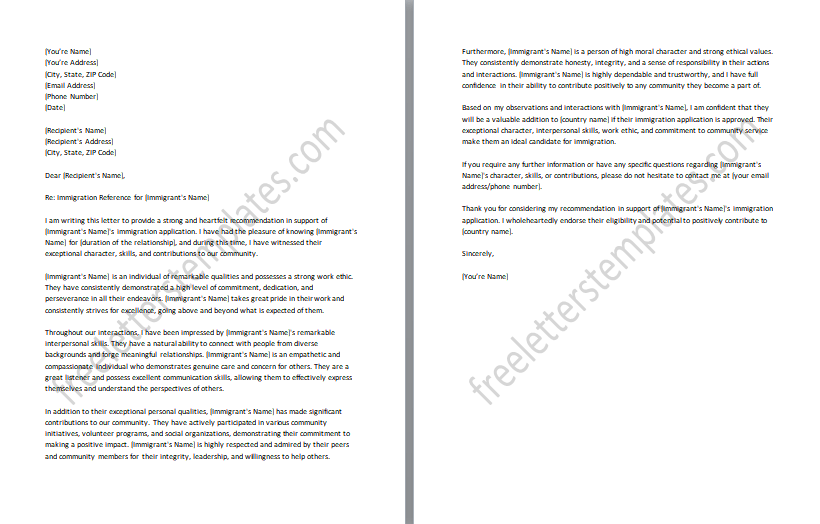
#10: Adoption Reference
An adoption reference letter is a heartfelt document provided by an individual who can provide insight into the character, parenting abilities, and suitability of prospective adoptive parents. These letters are often requested during the process to assess the applicant’s readiness and capacity to provide a nurturing and loving environment for a child. The purpose of an adoption reference letter is to offer a genuine and sincere evaluation of the prospective parents’ qualities, including their emotional stability, responsibility, and commitment to the well-being of a child. It highlights their ability to provide a safe and supportive home, their parenting skills, and their love and devotion to children. The letter serves as a valuable testimony, helping agencies or authorities assess the prospective parents’ suitability and make informed decisions in the best interest of the child.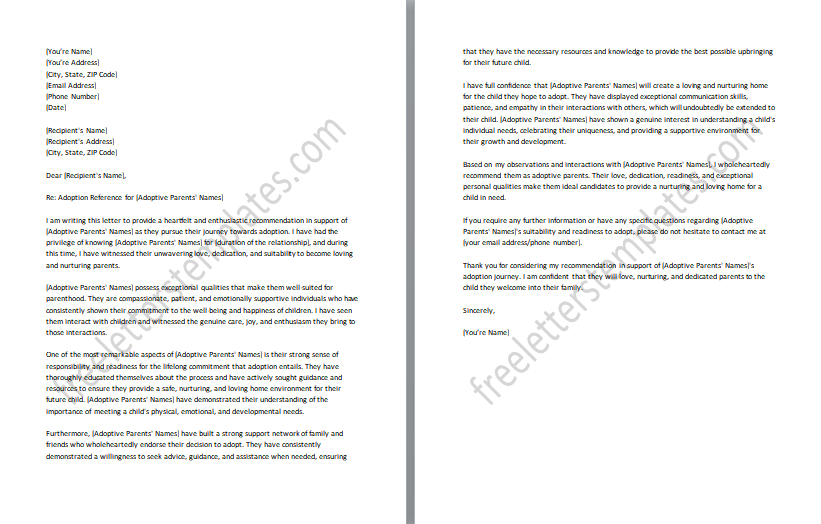
#11: Graduate School Reference
A graduate school reference letter is a significant document provided by someone who can personally attest to an applicant’s academic abilities, intellectual potential, and suitability for advanced studies in a specific field. These letters play a crucial role in graduate school applications, where applicants strive to showcase their qualifications, research prowess, and unwavering dedication to their chosen discipline. It goes beyond mere numbers and grades, shedding light on the applicant’s unique strengths, noteworthy achievements, and genuine passion for their field of study. This heartfelt letter serves as a powerful endorsement, giving the admissions committee a firsthand account of the applicant’s academic promise and potential for growth. By providing a personalized and credible assessment, the reference letter aims to bolster the applicant’s candidacy and increase their chances of securing admission to their dream program.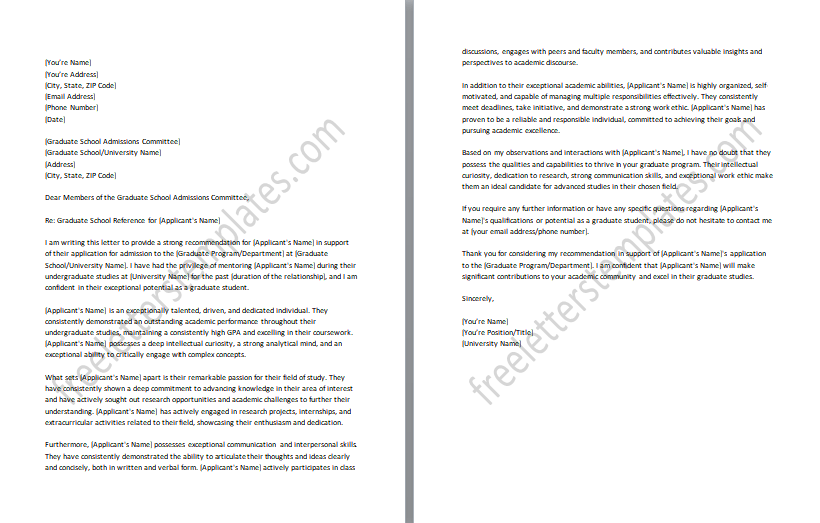
#12: Internship Reference
An internship reference letter is a valuable document provided by someone who can speak to an intern’s skills, work ethic, and overall performance during their internship experience. These letters are often requested by interns when they apply for future employment opportunities, further education, or other internships. It highlights their specific skills, professional demeanor, and ability to adapt and excel in a professional setting. The letter serves as a testimonial, showcasing the intern’s dedication, reliability, and willingness to learn and contribute to the organization. By emphasizing their unique qualities and showcasing their impact on projects and team dynamics, the reference letter aims to support the intern’s application and enhance their chances of securing future opportunities.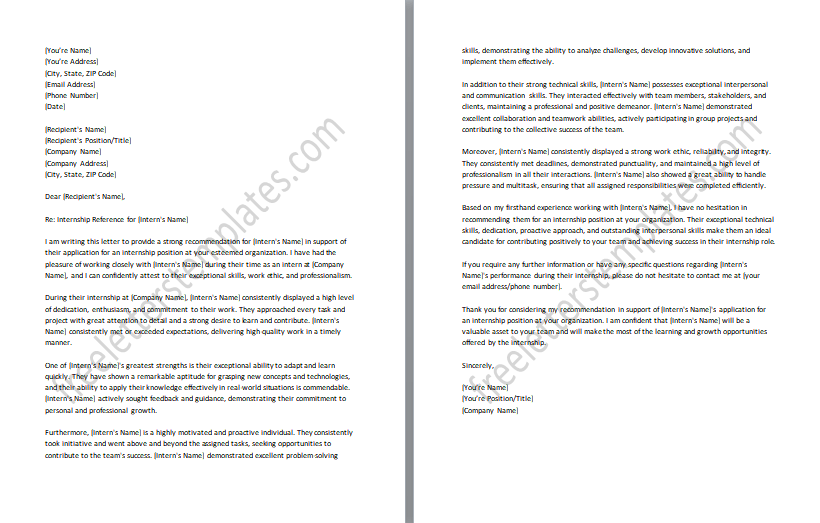
#13: Contractor Reference
A contractor reference letter is a significant document provided by someone who has firsthand experience working with a vendor and can provide an honest evaluation of their skills, professionalism, and performance. These letters are commonly requested when vendors apply for new projects, bids, or contracts, and they serve as a testament to their reputation and credibility. The purpose of a service provider reference letter is to offer insights into the vendor’s expertise, reliability, and ability to deliver quality services within agreed-upon timelines and budgets. It highlights their communication skills, problem-solving abilities, and their positive impact on the project and client satisfaction. This serves as a recommendation, demonstrating the vendor’s track record of successfully completing projects and their commitment to customer service.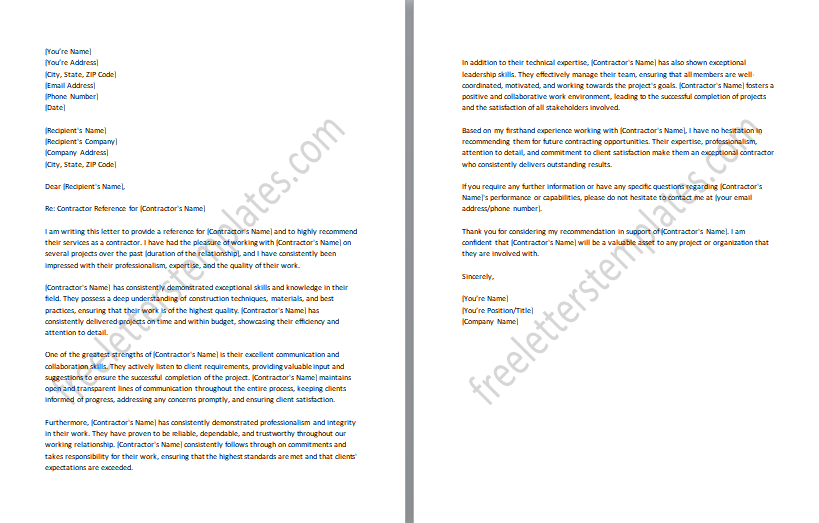
#14: Promotion Reference
A promotion reference letter is a significant document provided by someone who can provide an insightful assessment of an individual’s qualifications, performance, and suitability for a promotion within their organization. These documents are often requested when employees apply for internal promotions or advancements in their careers. The purpose of a reference letter is to offer a comprehensive evaluation of the employee’s skills, achievements, and potential for growth in a higher position. It highlights their leadership abilities, problem-solving skills, and their positive impact on the team and organizational goals. By emphasizing their unique contributions and providing evidence of their past accomplishments, the reference letter aims to support the employee’s advancement application and enhance their chances of securing the desired role.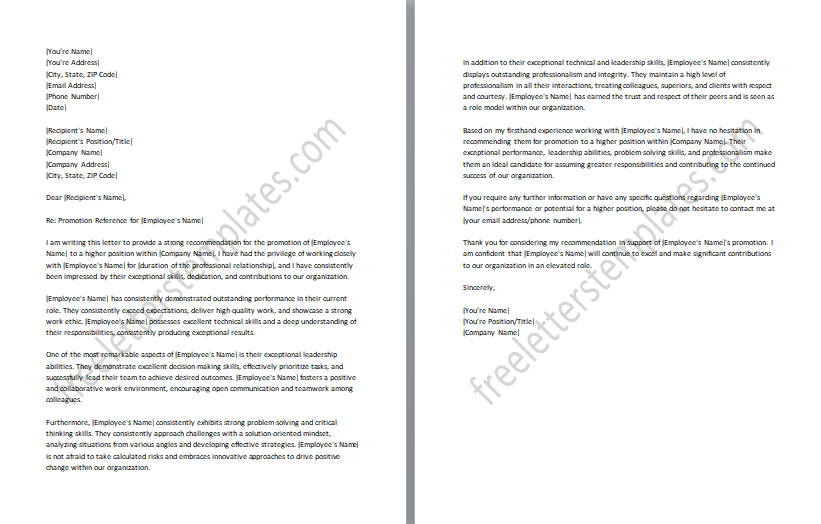
#15: Recommendation for Awards
A recommendation for accolades letter is a significant document provided by someone who can attest to an individual’s exceptional accomplishments, skills, and qualifications deserving of recognition or honor. These letters are often sought when individuals are being considered for prestigious awards, scholarships, or distinctions in various fields. The purpose of a recommendation for accolades letter is to provide a compelling endorsement of the individual’s outstanding contributions, remarkable achievements, and the positive impact they have had in their respective domain. It highlights their unique strengths, notable feats, and the profound influence they have had on others. The letter serves as a persuasive testimonial, showcasing the individual’s exceptional abilities, unwavering dedication, and the transformative difference they have made in their field.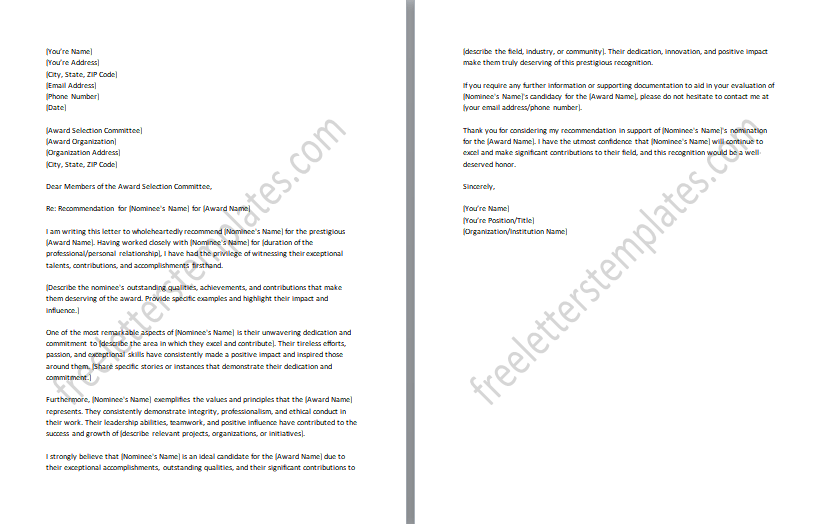
#16: Research Reference
A research reference letter is a significant document provided by someone who can provide an insightful evaluation of an individual’s research abilities, academic achievements, and potential in the field of study. These letters are often requested when they apply for grants, scholarships, or positions in academic or scientific institutions. It highlights their intellectual curiosity, dedication to rigorous practices, and their ability to generate meaningful insights and discoveries. By emphasizing their unique contributions and providing evidence of their excellence, the reference letter aims to support the researcher’s application and enhance their chances of securing funding, recognition, or career opportunities in the field.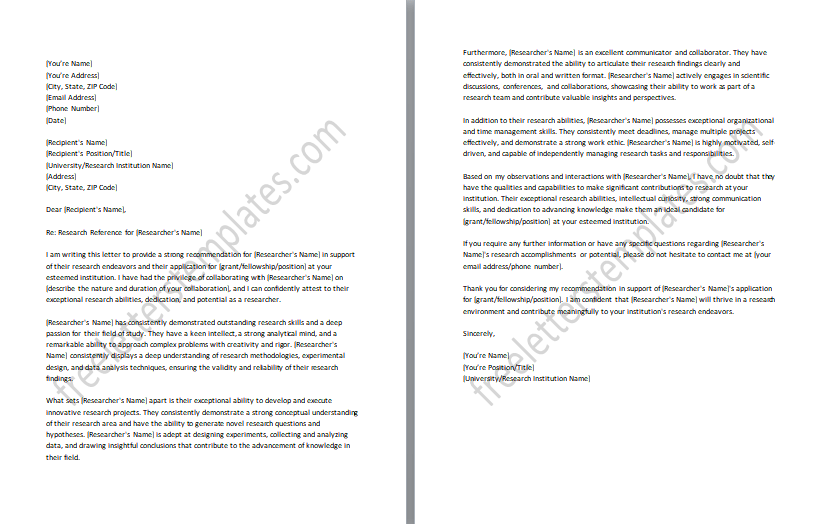
#17: Medical Reference
A medical referral letter is a crucial document provided by a healthcare professional who can provide an insightful evaluation of an individual’s medical history, condition, or suitability for a specific purpose. These letters are often required for treatments, procedures, or applications for specialized programs or services. The letter serves as a testimonial, providing important insights to support the individual’s case or to assist in making informed decisions regarding their healthcare. By highlighting relevant information, emphasizing the individual’s specific needs, or offering opinions, the reference letter aims to guide healthcare providers, insurers, or decision-makers in providing appropriate care or services.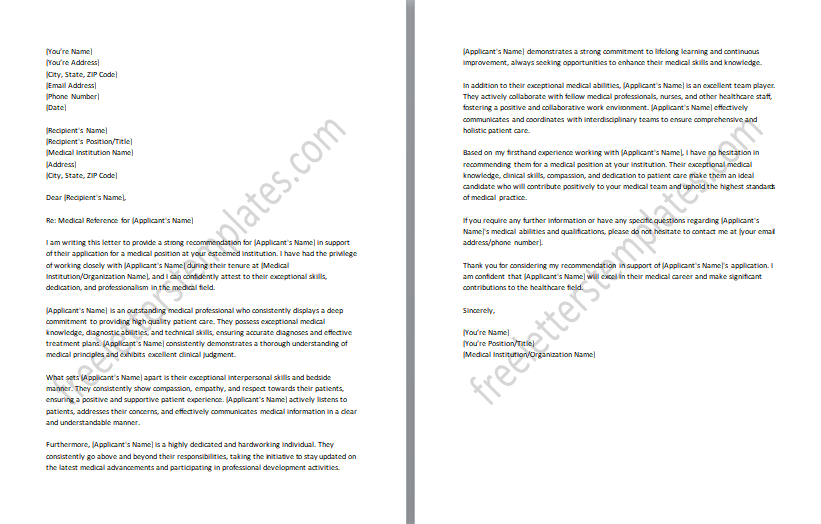
#18: Legal Reference
A legal reference letter is an important document provided by someone who can offer a thoughtful evaluation of an individual’s expertise, character, or suitability for a specific purpose. These letters are often requested for job applications, career advancements, or applications for licenses or certifications. It may include information about their education, work experience, areas of expertise, or notable achievements. The letter serves as a personal recommendation, offering insights into the individual’s integrity, professionalism, and ability to excel in their chosen field. By highlighting their skills, ethical approach, or the positive impact they have had on their work or organizations, the reference letter aims to support the individual’s professional aspirations and enhance their chances of achieving their desired career goals.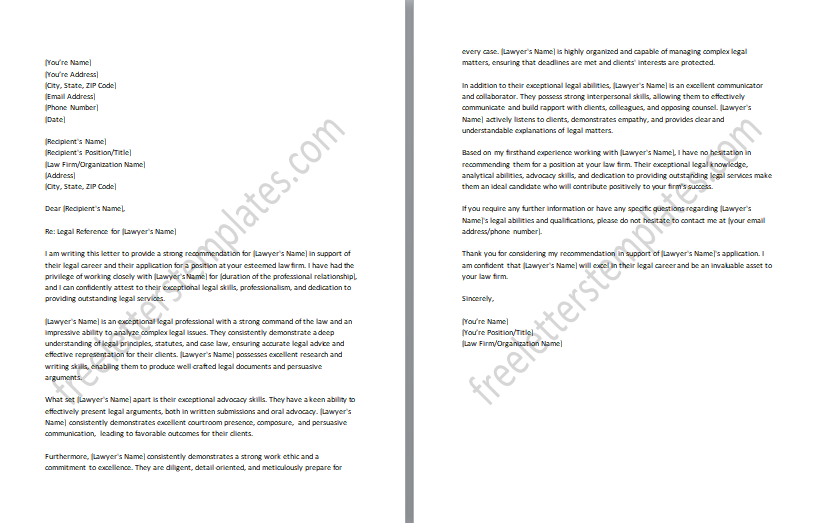
#19: Coaching Reference
A coaching reference letter is a valuable document that provides an in-depth evaluation of an individual’s coaching abilities, expertise, and impact on others. It highlights their skills, communication style, and their ability to inspire and empower individuals to reach their full potential. The letter aims to support the individual’s aspirations and enhance their chances of securing opportunities by showcasing their passion for coaching, their extensive experience, and the positive influence they have had on their clients or teams. It provides concrete examples of their approach, interpersonal skills, and commitment to ongoing personal and professional development.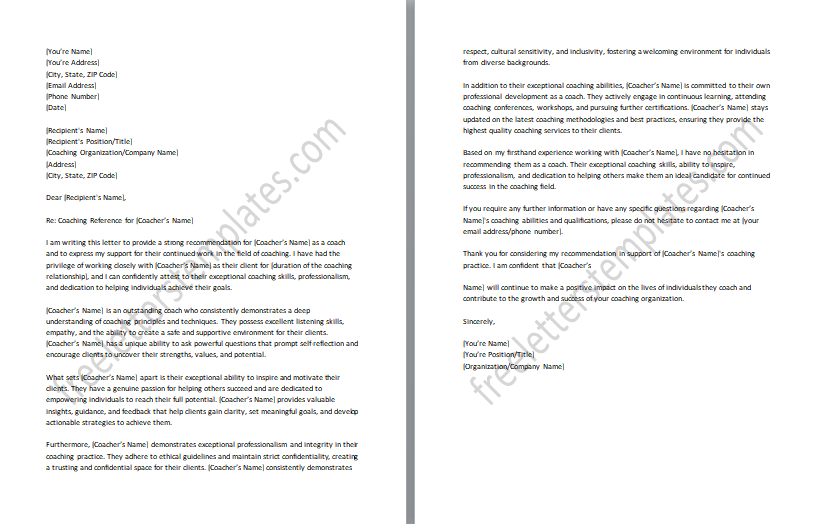
Professional Formatting and Presentation
When it comes to the formatting and presentation of reference letters, it’s important to create a polished and professional document that leaves a positive impression on the recipient. Here are some tips to guide you in achieving appropriate formatting and layout:
- Font Selection:
- Use a professional and easily readable font, such as Arial, Times New Roman, or Calibri.
- Maintain consistency by using the same font throughout the letter.
- Choose a font size between 10 and 12 points for optimal readability.
- Margins and Spacing:
- Set standard margins of 1 inch on all sides to provide sufficient white space.
- Use single or 1.5 line spacing to ensure readability and avoid clutter.
- Consider indenting the paragraphs for a visually appealing and organized look.
- Overall Document Layout:
- Begin with a clear and concise header that includes your contact information, the recipient’s name, and the date.
- Include a professional salutation, such as “Dear [Recipient’s Name],”.
- Organize the content into well-structured paragraphs, each focusing on a specific aspect of the individual’s qualifications.
- Use bullet points or numbered lists to highlight key achievements or skills for easy readability.
- Conclude the letter with a professional closing, such as “Sincerely,” followed by your name and contact information.
- Proofread and Edit:
- Before finalizing the reference letter, carefully proofread it for any grammatical or spelling errors.
- Check for consistency in formatting, font sizes, and spacing.
- Ensure that the content flows logically and that there are no repetitive or ambiguous statements.
Writing in a Positive and Balanced Tone
Maintaining a positive and balanced tone in a reference letter is crucial to effectively advocate for the individual’s qualifications and achievements. To achieve this, use descriptive language that vividly illustrates the individual’s skills, character traits, and accomplishments. Focus on specific examples and provide details to showcase their strengths and unique qualities. Avoid overly generic or vague statements that don’t provide meaningful insights. Instead, highlight the individual’s specific achievements, projects they have excelled in, and contributions they have made. By striking a balance between highlighting their strengths and maintaining objectivity, the reference letter will present a comprehensive and authentic picture of the individual’s capabilities and potential.
Concluding Thoughts
In conclusion, reference letters play a vital role in various aspects of our lives, whether it’s securing a job, pursuing higher education, or applying for opportunities and certifications. By carefully selecting the right referees, ensuring professional formatting and presentation, and maintaining a positive and balanced tone, reference letters have the power to make a significant impact. Whether you’re writing or requesting a reference letter, following the tips and guidelines outlined here will help you create compelling and authentic letters that enhance your chances of success. So, harness the power of reference letters and unlock new possibilities on your professional and personal journey.